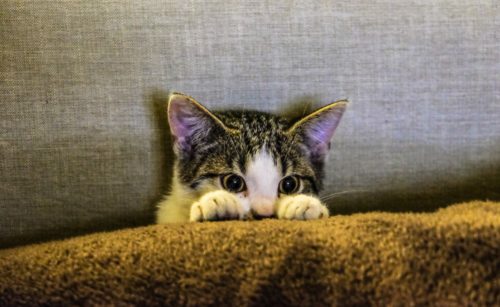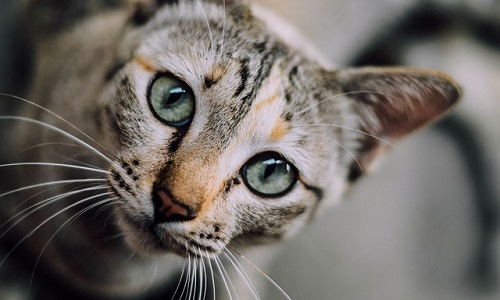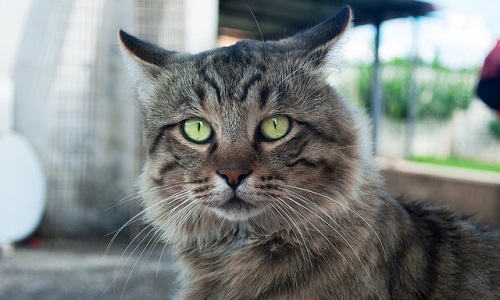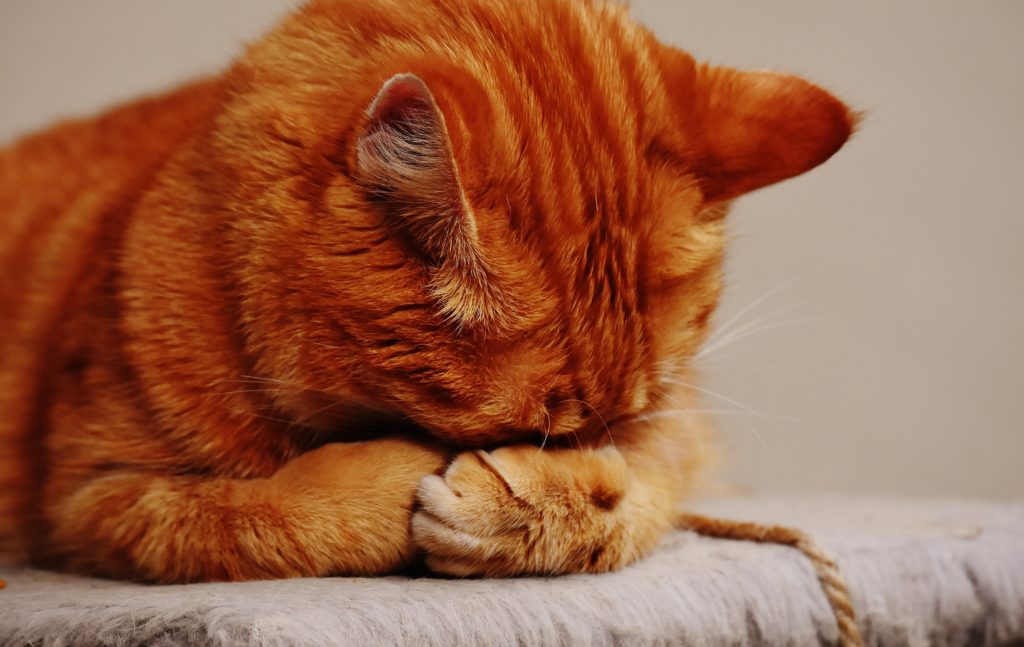It may sound a little bizarre, but cats can get gas just like people. While it’s not necessarily common (at least not noticeably common), it does happen. Feline flatulence could be due to a number of reasons, some more serious than others. In most cases, you probably won’t even know your cat is farting, because it usually won’t cause too much odor or make a sound that can be heard.
Sometimes, however, your cat can and will fart loud and proud. You just may not be around to hear it and bear witness. Still other times, the foul odor might make an appearance.
What’s funny, is if you ask a vet why your cat is farting, you may get looks of puzzlement and some thoughtful head-scratching. Replies like, “Good question!” or “I’ve never heard a cat fart!” will be standard. Many vets may laugh and say they’ve never heard a cat fart themselves, though they know cats can have gas and flatulence just like any other mammal.
So, Why is My Cat Farting?
Good question. The short answer is that your cat has air trapped in his digestive system, and when it’s expelled, he farts. As to the causes of gas in your cat, it can range from swallowing air because he ate too much, too fast, or because food has begun to ferment in his digestive tract because it’s not passing through quickly enough, or even because of intestinal parasites. Intestinal parasites can be picked up by your cat just about anywhere, including kennels, parks, and even your own lawn.
Usually, it’s because your cat has been exposed to fecal matter from other animals, and that fecal matter is loaded with parasites. Sometimes cats can develop colon disorders, stomach disorders, and disorders of the small intestine. When that happens, they may suffer from excessive gas and as a result, fart.
Cats can also develop gas from consuming a high-fiber diet, consuming food with fillers, eating food that is spoiled or trash from the garbage can, consuming dairy (because of an intolerance to lactose which is a common food allergy in cats), reacting to a sudden switch from his normal diet, and even fart and suffer from gas because of hairballs. Cats can also fart because of a diet that is too high in fat, food with spices in it, and foods that are hard to digest, like peas, beans, and soybeans. That’s why it’s imperative that you follow a cat nutrition checklist or talk to your veterinarian to find the perfect diet for your furry friend

Most often though, cats experience gas because of the first cause mentioned, swallowing air. Again, this could be from eating too much or too fast but it could also be due to your cat feeling as though he is competing with another cat in the house for his food, or feeding him right before exercise without giving his food adequate time to digest. Some breeds are also more prone to swallowing air than others. These are called brachycephalic breeds. Persian and Himalayan cats fall under the umbrella of brachycephalic breeds.
They can also have gas because of how much they ate regardless of how fast they ate it, because when a cat overeats, they consume more protein. This results in more sulfur gas in the body, which causes farting. Malabsorption can also play a role in feline flatulence. Malabsorption is an illness originating in your cat’s digestive canal and it results in your cat being unable to break down food properly. It can also trigger inflammatory bowel disease in cats.
Some felines may even develop gas and fart because of simple cat food allergies, such as a sensitivity to certain foods (which can definitely produce foul-smelling gas), chemicals, smoke,, and different poisonous plants to cats can all affect your pet’s health. Your cat could develop a gastric disorder like inflammatory bowel disease, or suffer from exocrine pancreatic deficiency or even respiratory diseases that can cause an increase in their rate of respiration, feline vomiting and cat diarrhea, and of course, gas.
Finally, some cats may develop a common condition called anal gland disease. This can cause their anal glands to become infected with abscesses and gas. Definitely not fun!
Should I Be Worried About My Cat Farting?
In general, no. In most cases, a cat farting is rarely anything more serious than a build-up of gas seeking release. If your cat’s gas is coupled with other clinical signs, there could be cause for concern. Some of the symptoms to watch out for that could be a warning of something more serious include feline abdominal bloat, audible rumbling in your cat’s belly, vomiting and diarrhea, pain when you touch your cat’s tummy, loss or diminished appetite in your cat, drooling excessively, blood in the stool, or scooting their anus on the floor.
These symptoms can all be a warning sign of more serious conditions, like viruses and parasites, intestinal diseases or obstructions, or malabsorption issues. If your cat shows any of these signs, you should take him to the vet so they can be properly examined and treated. Your vet may want to take some blood work and x-rays of your cat’s abdomen. They will also question you for a detailed history of all prior medical issues, as well as what your cat eats from day-to-day.
Preventing Cat Farting
If you don’t want to give your cat medications, there are things you can do to help prevent your cat from farting in the first place. First of all, if you suspect your cat’s diet may be playing a role, make sure you aren’t feeding him too much fiber. If your cat’s food is high in fiber, you’ll need to gradually shift them over to consuming a lower-fiber option that is easier for your cat to digest.
Don’t just change their food suddenly though, because that can cause its own set of problems. Talk to your vet and see what they recommend. Or try using the 80/20 rule. 80% of your cat’s food should be the old brand and 20% the new brand. Then over the course of a week or so, each day increase the percentage of the new brand and decrease the percentage of the old one. Once you have them switched to the new brand, if your cat still needs fiber to help reduce hairballs, you can add a little butter or cooked pumpkin to their food.
Sometimes just changing the type of proteins and carbohydrates you are feeding your cat can help. For instance, if they regularly eat food that is primarily fish and sweet potato, maybe switch it up and give them chicken and rice. Sometimes one food blend may sit better in their small tummies than another.
You also may need to assess the quality of food you’re feeding your cat. If it’s a poor quality, cheap brand, it will contain a lot of fillers that are difficult if not impossible for your cat to digest. Swapping your cat (again, slowly) over to a higher quality brand may help. If your cat still seems to be having an issue on higher quality food, then you may need to consider a possible intolerance or even an allergy to something in the food.
Lactose intolerance is a big problem for cats, so don’t give them milk or cream. They really only ever need water, but if you must give them any kind of milk, make sure it’s cat milk. It’s difficult to find out what other intolerances a cat may have without putting them on a special diet and proceeding by trial and error to see if you’re cat’s farting improves.
For cats that eat too quickly or consume too much food, try breaking larger meals up into smaller meals throughout the day, so that food has time to properly digest. And feed your cat away from other cats if there is too much competition happening. If your cats are competing each other for their food, they will eat more than they should, faster than is good for them.
Another way to help prevent gas and farting is to make sure your cat is getting regular exercise. A body that is healthy and moves often is better able to properly digest and eliminate their food. This is no different for cats. Use toys to encourage them to play and make sure they have things to scratch and climb on. If you have more than one cat, they will usually play together and get plenty of exercise, but if you only have one cat, it will be up to you to make sure they are moving around enough throughout the day.
To combat your cat’s opportunities for picking up parasites, make sure you keep their litter box clean and keep him indoors if possible so he isn’t exposed to other animal feces in you or your neighbor’s yard. You should also ask your vet about a good preventative medication to give him and make sure he is dewormed on a regular basis.

One last thing to be vigilant about is keeping a lid on your trash cans in the home, especially your kitchen one, although you should keep the smaller cans around the house away from kitty access too. For one, you never know what they may find in one of them, but with your kitchen trash especially, there is way too much opportunity for them to get into old, spoiled food or other garbage they shouldn’t eat. With smaller trash cans around your house, it’s common to throw away all sorts of things in them and you just never know what your cat may decide looks intriguing to eat. They could eat something and it could cause all sorts of tummy upset or even damage to the intestinal tract.
Ultimately, if you’re scratching your head and wondering why your cat is farting, don’t despair. It can be tough for anyone to narrow down. By using a little common sense and remembering the things that make your stomach upset could also cause your cat’s stomach to be upset, you may help reduce your cat’s flatulence or prevent them from farting entirely. Or, maybe you’ll get lucky and it will be the silent and non-deadly type. In which case, you won’t even know your cat has a farting problem!
Sources:
“Cat Flatulence (Gas) Causes and Treatments.” WebMD, Accessed 2, Jan. 2018. www.pets.webmd.com/cats/cat-flatulence-gas#1.
Bailey, Angie. “Do Cats Fart? What to Know About Cat Farts.” Catster, 14 Dec. 2018, Accessed 2 Jan. 2018. www.catster.com/cat-health-care/cat-farts-whats-normal-and-whats-not.
“Help! My Cat Won’t Stop Farting!” The Spruce Pets, Accessed 2 Jan. 2018. www.thesprucepets.com/why-do-cats-fart-554763.“Gas in Cats.” PetMD, Accessed 2 Jan. 2018. www.petmd.com/cat/conditions/digestive/c_ct_flatulence?page=2.
“Why Does My Cat Fart So Much? What You Need to Keep Your Cat Happy and Healthy.” A Cat Blog, 7 June 2018, Accessed 2 Jan. 2018. www.meowkai.com/why-does-my-cat-fart-so-much/.




